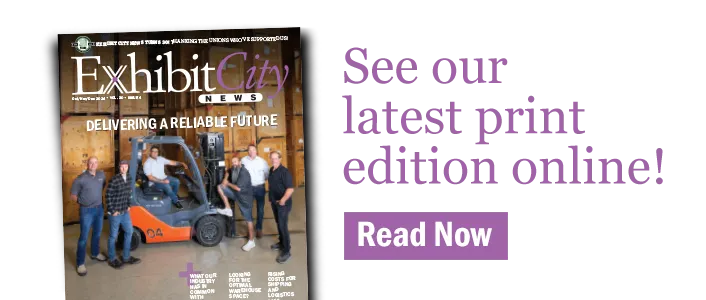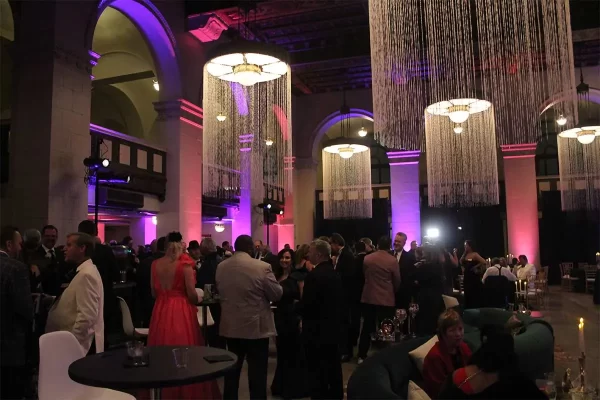Key Trends Shaping the Events Industry in 2024 Part 2
by Chris Kappes, Strategic Advisor and Writer, Exhibit City News
This digital version includes Trends Six through Nine. For the first half of this story, please go to this link.
Trend Six: ARTIFICIAL INTELLIGENCE
To sum up the event industry’s view on artificial intelligence (AI): it is both exciting and terrifying. We’re certainly in the infancy stage of AI potential and adoption, but this is accelerating through increased connectivity and instant communication. AI-powered chatbots are widely used by event marketers to promote and personalize messages, provide customer service, answer queries, and provide information to attendees. “The interesting thing about AI is that as it proliferates, authenticity increases in value. Where do you get authenticity? The live event industry,” shares Scott Kellner, George P. Johnson, SVP, Sales & Marketing.
David Sudjian, CEO, Sparks, shared in the recent issue of Corporate Event News that emerging technologies is his most pressing concern for 2024. “As we integrate these pioneering technologies, we envision a corporate events landscape transformed by technology but still deeply rooted in the principles of human connection and genuine, authentic experiences. Our commitment to this evolution is two-fold: to seamlessly blend these tools into our daily operations, increasing efficiency and foresight, and to integrate them into our client solutions, unlocking our potential to create richer, more immersive experiences.”
Industry leaders interviewed also suggest that AI has the potential to assist in analyzing data to identify trends, personalizing data to tailor guest experiences, identifying potential leads and customers, monitoring health and safety, optimizing logistics, predicting demand, elevating inventory, registration, networking, and lead generation.
Takeaway: AI is transforming the analog business of events into a technology-fueled future.
Trend Seven: SUSTAINABILITY
Sustainability is becoming a significant focus with convention centers and system companies leading the charge. “There’s demand from not just from our customers, but the end-user for durable, reusable, and sustainable exhibit systems,” shares Jillian Fafard, Director of Marketing, Aluvision. “More than just a call for environmental friendliness, this trend has risen from continued issues with supply chains and increases in shipping and labor costs.”
Brett Haney of Derse thinks the industry is at a tipping-point regarding sustainability consciousness. “Sustainability is not a fad. Clients are more concerned than ever and want to be informed about our sustainability practice. This is spilling over into new client RFP’s and is becoming a strong evaluation point.”
In response to industry-wide sustainability concerns, a cross-industry task force comprised of 14 leading tradeshow industry businesses and associations released a blueprint in 2022 for the industry to transition towards a more sustainable, low-carbon economy. Titled, Finding the Future Together: Towards a More Sustainable B2B Trade Show Industry in the U.S. and Canada, the blueprint highlights areas of reduction: carbon emissions including participant and logistics transportation, venue energy sources, waste management, food and depot waste, and booth materials. The blueprint covers 30 “quick wins” and longer-term actions to be accomplished in the next two to five years.
Takeaway: The sustainability push is happening and is changing how we think about and produce events.
Trend Eight: PRIVATE EQUITY INTEREST
We’re witnessing a growing trend of private equity firms expressing interest in acquiring event agencies. The influx of private equity into the events sector can be attributed to several factors, including the industry’s resilience, potential for growth, and the increasing recognition of events as a strategic marketing tool.
“The consumer and business event market are in the midst of a substantial resurgence,” explains MSouth Equity Partner Barry Boniface. MSouth Equity Partners recently completed an acquisition announcement for Fern which will join Nth Degree in its portfolio. “Spending in this segment is projected to outpace overall advertising and marketing investments as brands shift budgets to activities that engage buyers, create emotional connections and increase sales. We believe that is a significant opportunity.”
Debbie Parrott, President and Owner of Highmark TechSystems USA adds, “Private equity firms are attracted to business events for their unique combination of creativity, strategic planning, and execution capabilities. The post-pandemic landscape has highlighted the adaptability of event agencies, leading private equity investors to see the industry as an asset class. The trend is not only seen in established agencies but also in startups and niche players offering specialized event services.”
The infusion of private equity capital into event agencies is reshaping the industry’s competitive landscape. Larger financial backing enables agencies to invest in cutting-edge technologies, expand their service offerings, and explore new markets. This trend is indicative of a broader shift in how the events industry is perceived by the investment community—from a service-oriented business to a strategic partner in brand building and customer engagement.
While private equity interest brings financial backing, it also introduces challenges. Some industry insider’s express concerns about potential conflicts between profit-driven strategies and the creative, client-centric ethos of event agencies. Striking the right balance between financial performance and maintaining the essence of the events industry will be crucial for agencies navigating this trend.
Takeaway: Private equity is reshaping the future of event agencies and the industry.
Trend Nine: EVENT COMPANY DIVERSIFICATION
Event companies are diversifying. This trend aligns with the changing expectations of clients who seek integrated solutions that seamlessly blend physical and digital solutions that contribute to the clients’ overall marketing and brand-building objectives.
Diversification has been the growth engine for industry leader George P. Johnson Company. Robert Vallee Jr., grandson of George P. Johnson (GPJ) and Chairman and CEO of Project Worldwide, launched a visionary industry model in 2010 where independent, yet complimentary agencies spanning entertainment, digital, gaming, creative, media and retail, operate as accelerators to each another. Today, 14 multi-disciplinary agencies, owned and led by employees, comprise Project Worldwide, and support each other through collaboration, empowerment, community, and support.
“Our sister agencies help us connect all the dots,” shares Chris Meyer, GPJ CEO. “About seventy-five percent of our projects include one or more Project Worldwide agencies. Bottomline, we’ve figured out how to bring together the superpowers of each agency to our clients.”
Diversification also was instrumental to GPJ during the pandemic. “We leaned into our diversified agencies big time during COVID,” shared Meyer. “That played out very well for us whereas some of our competitors retrenched and are still playing catch-up.”
As clients seek more than traditional event planning, companies that embrace diversification are better positioned to thrive in an era where the definition of events continues to evolve.
Takeaway: Diversification is not a choice; it’s a necessity for staying relevant and resilient.
What Business Are We In?
We’re in a transformative period, influenced by digital integration, evolving workforce dynamics, and changing budget priorities. Staying ahead of these trends, embracing new technologies, and fostering genuine communities are crucial to thriving in this shifting landscape. The future of the tradeshow industry is one of flexibility, adaptability, and enduring value. Enjoy the ride.
Note: Research for this article was derived from dozens of industry leader interviews and written statements published in the book “Reinventing Live: The Always-On Future of Events” by Denzil Rankine & Marco Gibert and other industry publications.
This story originally appeared in the Q1 2024 issue of Exhibit City News, p. 40. For original layout, visit https://issuu.com/exhibitcitynews/docs/ecn_q1_2024.
































